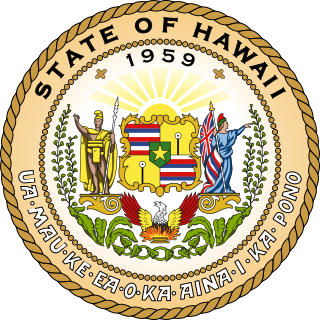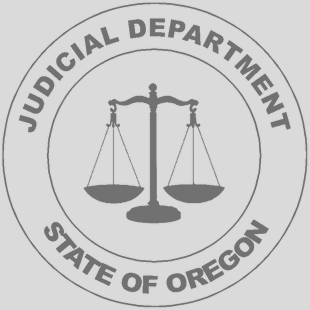In the United States, a state supreme court is the highest court in the state judiciary of a U.S. state. On matters of state law, the judgment of a state supreme court is considered final and binding in both state and federal courts.
In the United States, a state court has jurisdiction over disputes with some connection to a U.S. state. State courts handle the vast majority of civil and criminal cases in the United States; the United States federal courts are far smaller in terms of both personnel and caseload, and handle different types of cases. States often provide their trial courts with general jurisdiction and state trial courts regularly have concurrent jurisdiction with federal courts. Federal courts are courts of limited jurisdiction and their subject-matter jurisdiction arises only under federal law.

The United States courts of appeals are the intermediate appellate courts of the United States federal judiciary. They hear appeals of cases from the United States district courts and some U.S. administrative agencies, and their decisions can be appealed to the Supreme Court of the United States. The courts of appeals are divided into 13 "Circuits". Eleven of the circuits are numbered "First" through "Eleventh" and cover geographic areas of the United States and hear appeals from the U.S. district courts within their borders. The District of Columbia Circuit covers only Washington, DC. The Federal Circuit hears appeals from federal courts across the entire United States in cases involving certain specialized areas of law.

The United States district courts are the trial courts of the U.S. federal judiciary. There is one district court for each federal judicial district. Each district covers one U.S. state or a portion of a state. There is at least one federal courthouse in each district, and many districts have more than one. District court decisions are appealed to the U.S. court of appeals for the circuit in which they reside, except for certain specialized cases that are appealed to the U.S. Court of Appeals for the Federal Circuit or directly to the U.S. Supreme Court.
A county court is a court based in or with a jurisdiction covering one or more counties, which are administrative divisions within a country, not to be confused with the medieval system of county courts held by the high sheriff of each county.
Circuit courts are court systems in several common law jurisdictions. It may refer to:

The Hawaiʻi State Judiciary is the official name of the judicial system of Hawaiʻi in the United States. Based in Honolulu, the Hawaiʻi State Judiciary is a unified state court system that functions under the Chief Justice of the Hawaiʻi State Supreme Court who is its administrator-in-chief.

The United States District Court for the District of Hawaii is the principal trial court of the United States Federal Court System in the state of Hawaii. The court's territorial jurisdiction encompasses the state of Hawaii and the territories of Midway Atoll, Wake Island, Johnston Atoll, Kingman Reef, Palmyra Atoll, Baker Island, Howland Island, and Jarvis Island; it also occasionally handles federal issues that arise in the territory of American Samoa, which has no local federal court or territorial court. It is located at the Prince Kuhio Federal Building in downtown Honolulu, fronting the Aloha Tower and Honolulu Harbor. The court hears both civil and criminal cases as a court of law and equity. A branch of the district court is the United States Bankruptcy Court which also has chambers in the federal building. The United States Court of Appeals for the Ninth Circuit has appellate jurisdiction over cases coming out of the District of Hawaii. The United States Attorney for the District of Hawaii represents the United States in all civil and criminal cases within her district.
The Texas Courts of Appeals are part of the Texas judicial system. In Texas, all cases appealed from district and county courts, criminal and civil, go to one of the fourteen intermediate courts of appeals, with one exception: death penalty cases. The latter are taken directly to the Texas Court of Criminal Appeals, the court of last resort for criminal matters in the State of Texas. The highest court for civil and juvenile matters is the Texas Supreme Court. While the Supreme Court (SCOTX) and the Court of Criminal Appeals (CCA) each have nine members per the Texas Constitution, the sizes of the intermediate courts of appeals are set by statute and vary greatly, depending on historical case filings and so that the justices on each court can timely adjudicate the volume of cases regularly before them. The total number of intermediate appellate court seats currently stands at 80, ranging from three, four, six, seven, nine, and thirteen (Dallas) per court.

The Oregon Judicial Department (OJD) is the judicial branch of government of the state of Oregon in the United States. The chief executive of the branch is the Chief Justice of the Oregon Supreme Court. Oregon’s judiciary consists primarily of four different courts: the Oregon Supreme Court, the Oregon Tax Court, the Oregon Court of Appeals, and the Oregon circuit courts. Additionally, the OJD includes the Council on Court Procedures, the Oregon State Bar, Commission on Judicial Fitness and Disability, and the Public Defense Services Commission. Employees of the court are the largest non-union group among state workers.

The Florida circuit courts are state courts and trial courts of original jurisdiction for most controversies. In Florida, the circuit courts are one of four types of courts created by the Florida Constitution.
Oregon's circuit courts are general jurisdiction trial courts of the U.S. state of Oregon. These courts hear civil and criminal court cases.

The Judiciary of New York is the judicial branch of the Government of New York, comprising all the courts of the State of New York.
The Kentucky Circuit Courts are the state courts of general jurisdiction in the U.S. state of Kentucky.

The Louisiana Circuit Courts of Appeal are the intermediate appellate courts for the state of Louisiana.

The South Carolina Circuit Court is the state court of general jurisdiction of the U.S. state of South Carolina. It consists of a civil division and a criminal division.

In Hawaii, the LGBT laws have been evolving for the past hundred years. In the pre-19th century, the influence of Polynesian culture led to a more open-minded state. After the first Christian missionaries began arriving in Hawaii, strict sodomy laws were enacted. Territory v. Bell (1958) was the last sodomy case argued in Hawaii. After the turn of the 20th century, LGBT issues began being taken to and decided by the Supreme Court. In 2013, Hawaii voted in favor of gay marriage, and marriage licenses began to be issued to LGBT couples.
The Florida State Courts System is the unified state court system of Florida.
The judiciary of Illinois is the unified court system of Illinois primarily responsible for applying the Constitution and law of Illinois. It consists of the Supreme Court, the Appellate Court, and circuit courts. The Supreme Court oversees the administration of the court system.
Todd W. Eddins is an American lawyer who has served an associate justice of the Hawaii Supreme Court since 2020. He previously served as a judge of the O'ahu First Circuit Court of Hawaii from 2017 to 2020.










